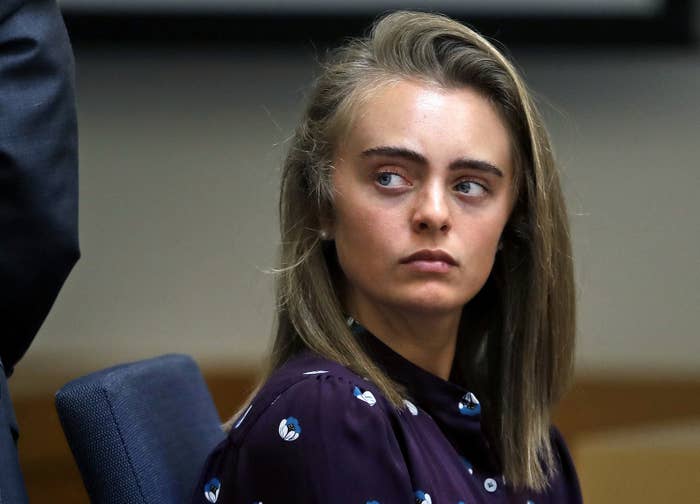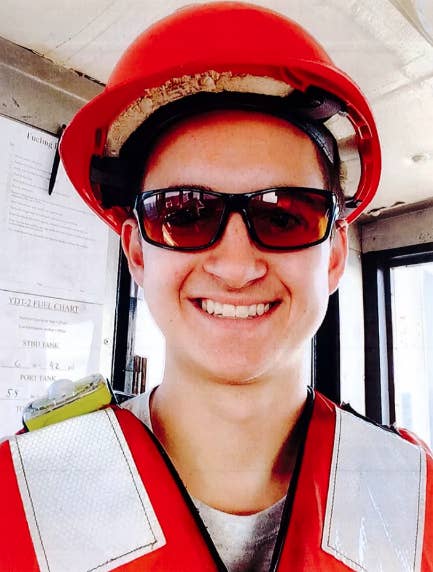
Michelle Carter, the woman who was convicted of involuntary manslaughter for urging her boyfriend to kill himself, is asking for her conviction to be overthrown.
Her new team of lawyers — which includes William Fick, a defense attorney for the Boston Marathon bomber Dzhokhar Tsarnaev — filed an appeal last month requesting the highest court in Massachusetts to review and overthrow her conviction, the Boston Herald first reported.
Last June, a Massachusetts judge found Carter, 20, guilty of involuntary manslaughter in the death of her 18-year-old boyfriend Conrad Roy, who killed himself in 2014 by inhaling carbon monoxide produced by a water pump in his truck.
Roy — who had a history of mental illness and had previously attempted suicide — got out of the truck because he was "scared," but Carter told him to "get back in" during a phone call moments before his death, according to evidence presented by Bristol County prosecutors.
"Carter is the first defendant to have been convicted of killing a person who took his own life, even though she neither provided the fatal means nor was present when the suicide occurred," Carter's lawyers wrote in their Feb. 5 appeal to the Supreme Judicial Court, as reported by masslive.com. "Nothing in Massachusetts law made clear to 17-year-old Carter, or anyone else, that such circumstances could constitute involuntary manslaughter," the appeal said.

During her trial last year, prosecutors had argued that through text messages and phone calls, Carter had pressured Roy to kill himself, instructed him as to when and how to do it, assuaged his concerns over killing himself, and chastised him when he delayed doing so. They said that Carter, then 17, used Roy as a "pawn in her sick game of life and death" and wanted to be "the grieving girlfriend" to gain her peers' attention and sympathy, which she always craved.
Carter's attorneys argued that Roy was suicidal over a long period of time and was "on this path to take his own life for years." They also said Carter could not have caused his death because she was 30 miles away when Roy killed himself, and that his death was a suicide, not a homicide. Psychiatrist Peter Breggin — who is known for his criticism of psychiatric drugs and has had his credibility questioned in court — testified that Carter was "involuntarily intoxicated" by antidepressants, which made her "delusional" and "grandiose."
However, Judge Lawrence Moniz ruled that Carter's actions constituted "wanton and reckless conduct" when she instructed Roy to get back in his truck despite knowing that it was a toxic environment "inconsistent with human life." He said that her conduct caused Roy's death.
Moniz sentenced to her to two and a half years in prison, of which Carter will serve only 15 months after her state appeals are exhausted.
"We were interested in representing her because we were troubled by the result," Nancy Gertner, a former federal judge who is part of Carter's new defense team, told the Boston Herald. "This case raises substantial issues that the Supreme Judicial Court should address."
Carter's attorneys feel that the case should be heard directly by the Supreme Judicial Court, because they believe her conviction violated the state and the country's constitutional laws. They were also concerned that it would "set precedent for who may be prosecuted for encouraging suicide with words alone" and felt that the case's implications about assisted suicide warranted an immediate review by the state's highest court, according to the appeal.
“It also brings up novel issues of law in Massachusetts: What constitutes manslaughter?" Daniel Marx, another high-profile attorney who is representing Carter, told the Boston Herald.
Carter's lawyers did not immediately respond to BuzzFeed News' request for comment.
